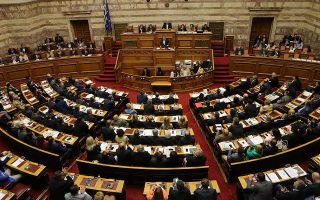Why SYRIZA has survived

The cutbacks imposed in 2015 after the Greek government’s clash with the country’s European creditors don’t count anymore. The people believe that they paid, but kept their dignity, and that they may have lost, but at least they put up a fight.
Four years later, measures in support of the most vulnerable serve as a reminder of governing SYRIZA’s socially sensitive profile. With the handouts he announced earlier this month, Prime Minister Alexis Tsipras rallied a significant section of the working class, which does indeed have to count every cent, while also placating others who are in the same boat but do not usually vote for the Left. This softening of anti-government reflexes favors voter abstention, serves to boost the smaller parties and pares down opposition New Democracy’s lead.
The government’s strategy is aided by the fact that, for the first time since Costas Karamanlis was at the conservative party’s helm, New Democracy is not leading efforts to help the weak, but simply giving it support.
And what about the reforms? With the work it has done in the areas of social rights (with the cohabitation agreement and gender identity issues, for example), in the separation of Church and state, on certain aspects of the memorandum and in its foreign policy (the Prespes name agreement), SYRIZA has created a reformist profile that is more progressive than that of New Democracy. The prime minister’s excellent relationship with the European and American establishment, moreover, further weakens the anti-Tsipras camp.
The pro-Europeans are no longer eager to see the end of the Tsipras era, as the fear of Grexit is now behind us.
Orban-style interventions in the work of the justice system (as in the Novartis case), the manipulation of information, the deadly fires in eastern Attica and the concessions made in the Prespes name deal are issues that have remained on the sidelines during the pre-election period. New Democracy has chosen instead to focus on things like the behavior of Alternate Health Minister Pavlos Polakis, making the electoral dilemma a rather lackluster one. The opposition has failed to represent a powerful tide of change. In the meantime, we cannot know whether the phenomenon that has appeared with growing consistency since 2012 will reappear this time around: Two in 10 SYRIZA voters do not state their true intention to pollsters (nor even to their friends), keeping their choice a secret all the way to the ballot box.
Of course, the damage to the government has not been negligible, while New Democracy leader Kyriakos Mitsotakis’ liberal agenda resonates with a significant portion of the middle class. Nevertheless, for all the reasons mentioned above, the European elections that are supposed to signal the end of SYRIZA are looking like they’re shaping up into a very interesting battle.





